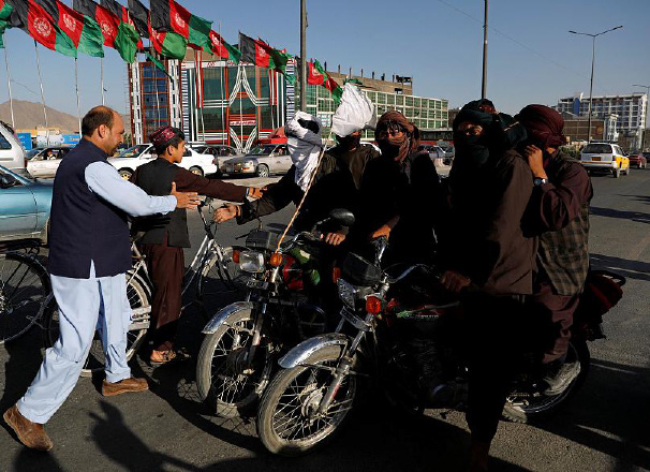KABUL - “The truce is over. Our security forces are allowed to resume their operations and the reason is that the peace plan was offered from a point of strength not weakness,” Ghani told reporters here.
The president said the ceasefire was an experiment in a situation which was under control as the fighting went on and security forces responded to attacks and stayed ready for every situation.
Ghani said the ceasefire, which lasted 18 days after it was extended once and overlapped with the Taliban’s unilateral three-day truce for Eid, had been “98 percent successful.”
After the government announced unilateral ceasefire before Eidul Fitr, the Taliban responded by declaring a three-day lull in the fighting --- unprecedented in the nearly 17-year conflict.
The truces triggered jubilant scenes across the war-weary country, with Taliban fighters and security forces spontaneously celebrating the Eid holiday, hugging each other and taking selfies.
Ghani said the ceasefire had shown that the majority of the insurgents wanted peace and it was the “Taliban’s turn to give a positive response.” “I am ready to extend the ceasefire anytime when the Taliban are ready,” he said at a press conference.
But on Tuesday, the Taliban vowed to continue their bloody fight against the government and their foreign backers, unconcerned about civilian casualties.
Talking to reporters, President Ghani said corruption, violations of law and crimes had been hereditary from the past one decade and reiterated commitments to break monopoly over the peace and reconciliation process.
Earlier some Wolesi Jirga members said the government should have shared information with them regarding the peace process while others mocked the government peace plan.
The president linked the Afghan peace process to three internal players -- one Taliban, second, the people of Afghanistan and third the government.
“Now the Taliban are confronting the people of Afghanistan, the ulema, the religious scholars of Pakistan, Mecca and Madina, the ulema of Islamic ummah. The government is also facing pressure from these elements but it discharged its responsibility and now it is the Taliban’s turm to respond,” said Ghani.
President Ghani said his main responsibility was to stop the bloodshed and pave the ground for security and then prosperity. He said it was a phase of review and preparation for intra-Afghan peace negotiations.
“There was no plan for peace since the Saur Revolution in 1978, but the new initiative for peace will listen to views of people from all classes of the society, Ghani added.
Ghani called the Afghans “a great nation” and said the Afghans showed their greatness during the ceasefire as they behaved good with Taliban instead of showing violence.
“Our political class should also learn from patience and respect of people, people’s emotions are important and we should not stand against them,” the president added.
“Taliban! Come and show your willingness for peace, it is an Afghan pressure not a foreign, it is the demand of ulema and the nation, make a decision. The Ulema invite you to the Quran and the people send you their children (for asking peace), now it is your decision whether to kill the nation or respond positively,” he said.
He added the national unity government had talked to people of different segments about peace since its establishment.
“The current international, regional and national consensus on peace has passed from different phases and has now turned into an overall national consensus and demand,” he said.
Ghani said no one could monopolize the peace process and supporting peace was now a demand of all Afghans.
He added around 7,000 people in the holy month of Ramadan and around 4,000 people in Eid holidays visited the Presidential Palace and 95 percent of them supported peace.
About rumors of Safe Zones in the country, Ghani said that it was not a government’s plan and the government would not hand over any area to anyone.
The president said his first promise during his presidential campaign was to bring peace and signing a peace agreement with Hezb-I-IslamiGulbuddin (HIG) was his first step towards peace.
“Our every steps for peace is based on plan and strategy, they are taken not in hurry or based on emotions,” he said. “Another step for peace is consensus over peace plans.”
“Regional consensus for peace has developed to the most extent, there is no regional consensus for war, in contrary to the past, regional countries have promised to cooperate with us in achieving peace,” he said.
He said four years ago, member states of the Shanghai Cooperation Organization (SCO) were concerned about the situation in Afghanistan, but now they were no longer worried.
“The situation has changed now, you saw all members of SCO last month in a conference supporting the Afghan peace process and promising to cooperate, it was an unprecedented step from SCO last month,” he said.
He said his dialogue about peace was based on Prophet Mohammad (SAW) teachings and the prophet’s life was a method of life for him.
Ghani said the US’s new strategy for Afghanistan and South Asia was bringing peace and stability to Afghanistan. (Pajhwok)
Home » Afghanistan » Ceasefire Over, but Efforts for Peace to Continue: Ghani
Ceasefire Over, but Efforts for Peace to Continue: Ghani

